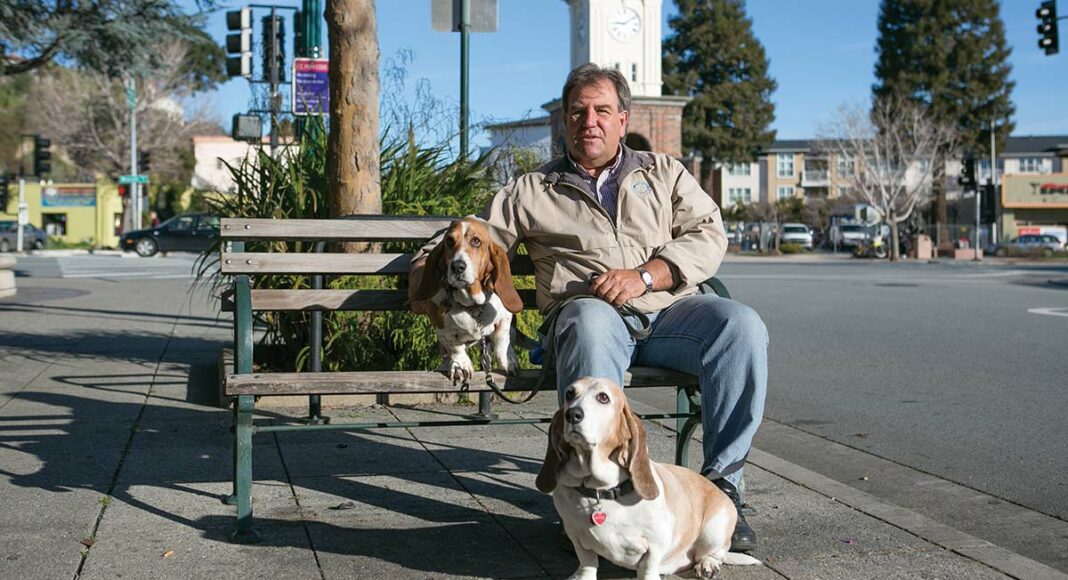The housing crisis in Santa Cruz County has reached a fever pitch. But while there’s plenty of handwringing, there aren’t a lot of options being proffered to solve it, according to Michael Bethke, a longtime planning expert.
“We need to change the conversation,” says Bethke, who is moving to Georgia this month. “A paradigm shift is needed in terms of how we view housing.”
Bethke, a one-time county fair manager and self-proclaimed “change agent,” has spent the better part of his career working to improve housing and living conditions throughout the greater Bay Area, most recently in Santa Cruz.
About two years ago, he launched a program aimed to help the owners—or inheritors—of red-tagged properties get those properties up to code, with the caveat that proceeds from their sale be donated to charity.
Bethke is moving to Georgia for a variety of reasons, including the desire to be closer to his aging mother-in-law. The comparative affordability of housing in that state is also a draw. He’s also moving closer to Habitat for Humanity’s headquarters, an organization he’s hoping to sell on some of the programs he’s developed in Santa Cruz.
Bethke’s recent pet project, “For Sale, For Good,” worked on the premise that house flipping could be used for a good cause. Bethke and a cohort of others, as covered in GT in 2014, took a once-derelict home in the Zayante Valley, fixed it up, and then sold it, with the proceeds going to the local Boys and Girls Club, Jacob’s Heart and other local nonprofits.
“By doing so, [these workers] have also turned a long and tragic story of code violations, neighborhood unrest and untold legal battles into a beautiful story of redemption,” says Bethke, a contractor who also worked as project manager for the iconic Rittenhouse building on Pacific Avenue.
Rusty Hartman was a character straight out of a 1960s novel, a free spirit who sought to create his own version of a utopian residential retreat. Unfortunately, “Rusty’s Retreat” became ground zero for several decades of battles with tenants, neighbors and the County of Santa Cruz.
After Hartman’s death in 2013, members of the deceased’s living trust approached Bethke. Hartman’s estate remained embroiled in court battles after his death, and those in control of his trust sought to find a way to use his remaining assets for a positive effect in the community. After months of work and the efforts of many people, the property was brought up to code and sold, with the profits then going to the nonprofit cause.
Bethke’s hope was to take this proven example and replicate it, and he began working with a couple of other estates to build a living trust that would establish the requirement that the proceeds from the sale go to a good cause.
The project had the potential to be a feel-good situation all around.
“It is comforting to know that no matter how far down we may have gone, and no matter what kind of checkered legacy we may have left behind, we all still have the opportunity to do something good before we die, and hence, receive one of the most gracious gifts of all—redemption,” Bethke says of the project.
Unfortunately, like so many other projects, “For Sale, For Good” quickly became mired in the exact red tape that it was trying to fight against, Bethke says, which prevented them from flipping more houses. The costs of permits, not to mention the amount of time and effort going into obtaining those from the county planning department, quickly added up to more than Bethke and his team could handle.
While in Georgia, Bethke plans to leverage his longtime work with Habitat for Humanity, which is based in Atlanta, and get the organization interested in something that would be radically different than what Habitat has historically pursued. He says his vision for housing also flies in the face of what’s been more or less the status quo.
He would like to encourage more communities to incentivize building accessory dwelling units (ADUS), the converted garages and back houses sometimes referred to as “granny units.” As part of that vision, he’d like more properties to have what’s called tenancy in common, where different owners can be listed on a title and own different fractions of a property.
Bethke believes this could be a new paradigm for Habitat for Humanity to pursue. Traditionally the nonprofit organization, founded by Jimmy Carter, has sought solely to build entirely new properties with the emphasis on single-family dwellings.
The perk is that these accessory units don’t require a separate sewer and water hookup, making them infinitely cheaper from an infrastructure perspective as well as a residential one. At the end of the day, Bethke explains, a house is not just a structure. It is a home—something that everyone should have the right to. And as a society, he explains, it’s our responsibility to ensure that is a reality for our citizens.
“We need to make it so that people in Santa Cruz, and elsewhere, can actually afford to age in place,” he says. “Incentivizing the development of ADUs could go a long way towards allowing this.”
.Housing Authority














